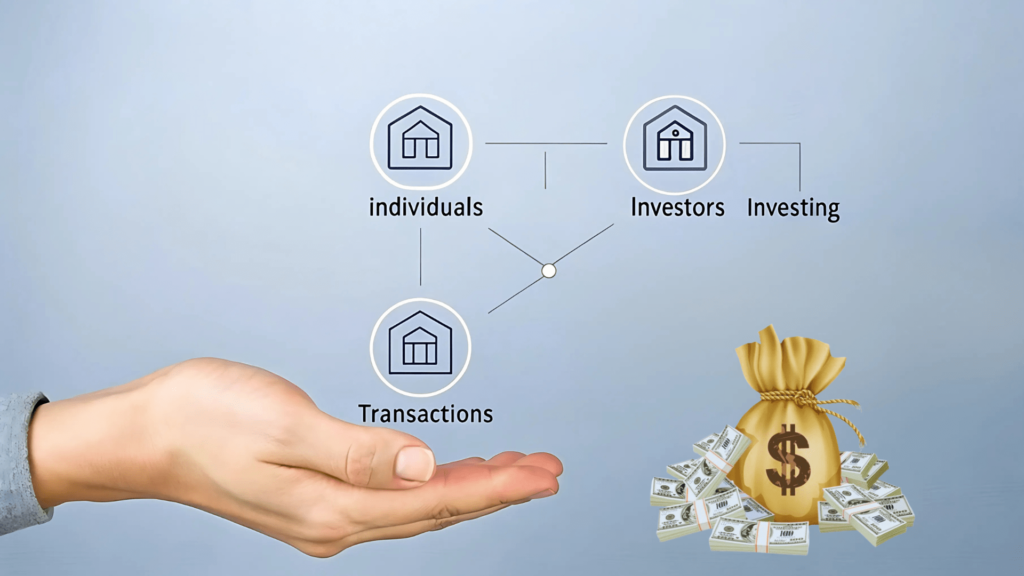Peer-to-peer real estate platforms are changing how people invest in property. Instead of relying on traditional banks or large institutions, these platforms let everyday investors connect directly with property owners or developers. But how do they actually work?
In this guide, we’ll explore the process, highlight the benefits, and help you understand if this modern approach to real estate is right for you. Whether you’re new to real estate investing or looking for innovative ways to grow your portfolio, P2P platforms offer an exciting opportunity.
Table of Contents
ToggleWhat Are Peer-to-Peer Real Estate Platforms?
Peer-to-peer real estate platforms are online marketplaces connecting buyers, sellers, and investors directly, often bypassing traditional intermediaries such as real estate agents or brokers. These platforms aim to simplify transactions and lower costs while providing a user-friendly interface to manage investments or property listings.
How Do They Work?
The basic principle of peer-to-peer platforms is straightforward:
- Registration: Users create an account and verify their identity.
- Listing or Investment: Sellers list properties, providing details like price, location, and condition. Investors or buyers can browse available properties or investment opportunities.
- Transactions: The platform facilitates communication, negotiations, and, in some cases, financing or escrow services.
- Completion: Legal documentation and payment processes are managed, often digitally, to complete the transaction.
Many platforms focus on fractional ownership, enabling users to invest in real estate with smaller amounts of capital, making it accessible to a broader audience.
Key Features of Peer-to-Peer Real Estate Platforms
Here are the key features of peer-to-peer real estate platforms:
Direct Connection
-
- What it means: Buyers and sellers can interact directly without relying on middlemen, like real estate agents or brokers.
-
- Why it matters: This fosters clearer communication and faster transactions, often resulting in better deals for both parties.
Lower Costs
-
- What it means: These platforms typically charge lower fees than traditional brokerage services.
-
- Why it matters: By cutting out intermediaries, users save money, which can be significant in large real estate transactions.
Transparency
-
- What it means: Users can access detailed information about properties, investment opportunities, and market conditions.
-
- Why it matters: Transparency builds trust and allows buyers and sellers to make informed decisions without hidden surprises.
Flexibility
-
- What it means: Platforms often provide diverse options, such as fractional ownership (owning a portion of a property), direct purchases, or managing rental properties.
-
- Why it matters: Users can choose the investment or transaction type that best fits their needs and goals.
Digital Management
-
- What it means: These platforms streamline tasks like document signing, payment processing, and status updates through intuitive digital tools.
-
- Why it matters: It saves time, reduces paperwork, and enhances convenience for users managing transactions online.
Would you like to explore how these features benefit specific user groups, like first-time buyers or investors?
Is Peer-to-Peer Real Estate Legit?
Yes, peer-to-peer real estate platforms are legitimate and increasingly popular. Companies like Fundrise, Roofstock, and RealtyMogul are leading the industry with thousands of satisfied users. However, as with any investment, due diligence is essential. Check for platform reviews, licensing, and compliance with local real estate laws.
Traditional Real Estate vs. P2P Platforms
Traditional Real Estate:
-
- Agent Commission: 5-6% of the sale price
-
- Closing Costs: 2-5%
-
- Additional Fees: Marketing, staging, etc.
P2P Real Estate:
-
- Platform Fees: 0.5-2% of the transaction amount
-
- Lower Closing Costs: Often streamlined and reduced
-
- No Agent Fees: Direct communication eliminates this expense
For a $300,000 property, using a Peer-to-peer Real Estateplatform can save tens of thousands in fees compared to traditional methods.
Pros and Cons of Peer-to-peer Real Estate
Advantages ✓
-
- Lower transaction fees
-
- Faster processes
-
- Accessibility for small-scale investors
-
- Greater control over transactions
Disadvantages ✗
-
- Limited support for complex transactions
-
- Risk of scams or unverified listings
-
- Less market reach for sellers compared to MLS
-
- Requires familiarity with digital platforms
Success Stories and Case Studies
The section highlights real-world examples of how individuals and groups have benefited from using peer-to-peer (P2P) real estate platforms. These platforms enable direct interaction between buyers, sellers, and investors without traditional intermediaries, streamlining processes and often yielding better outcomes.
Key Examples:
Fractional Investors:
-
- Platforms like Fundrise offer opportunities for investors to own small portions (fractions) of real estate properties.
-
- These investors reported average annual returns of 8-12%, making it an attractive option for those looking to grow wealth through real estate without owning entire properties.
Independent Sellers:
-
- Platforms such as Roofstock specialize in buying and selling rental properties, particularly those already generating income.
-
- Sellers using Roofstock managed to sell properties 20% faster than through traditional real estate channels, likely due to the platform’s focus on connecting motivated buyers and sellers in the rental markets.
Best Practices for Using P2P Real Estate Platforms
Research Thoroughly: Understand platform fees, reviews, and terms.
Prepare Your Listing: High-quality photos, accurate details, and competitive pricing attract buyers.
Verify Listings and Users: Protect yourself from scams by verifying all parties involved.
Leverage Tools: Use built-in calculators, market reports, and analytics provided by the platform.
Understand Legal Requirements: Ensure compliance with state-specific real estate laws.
Bottom Line
Peer-to-peer real estate platforms offer a compelling alternative to traditional buying, selling, or investing. Their cost savings, accessibility, and transparency make them ideal for tech-savvy users seeking control over their real estate endeavors. However, success requires careful research and active management.
Next Steps:
- Explore leading platforms like Fundrise, Roofstock, and RealtyMogul.
- Assess your financial goals and risk tolerance.
- Consult with a real estate attorney for legal guidance.
- Start small with fractional investments or a single listing to understand the process.
